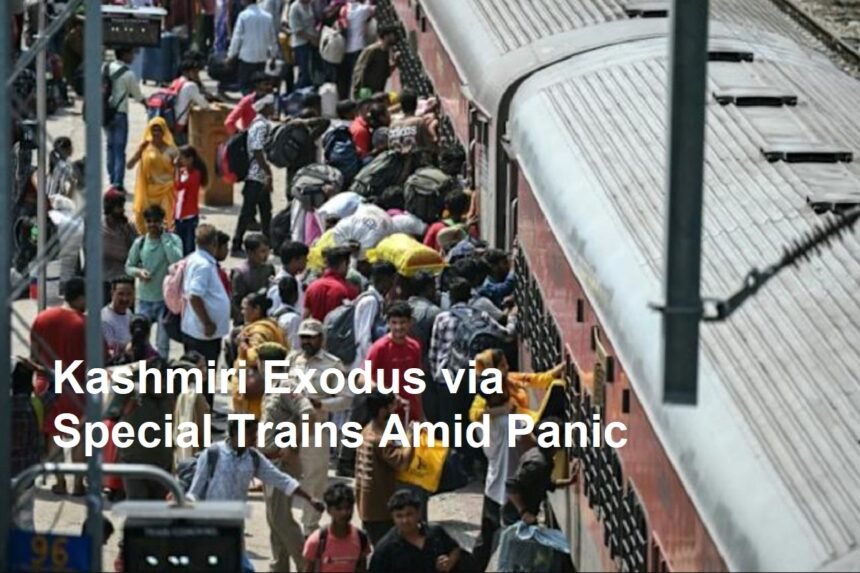In recent times, reports have emerged about Indian citizens in Kashmir experiencing panic and choosing to leave the region via special trains. While the specifics of this situation are still unfolding, it reflects a complex and deeply rooted context involving political tensions, security concerns, and humanitarian considerations in the Kashmir region.
Kashmir, a region long marked by territorial disputes and conflict, has historically been a flashpoint between India and Pakistan, with significant implications for the local population. The area has witnessed periods of unrest, military presence, and political upheaval, which have often led to disruptions in daily life and heightened insecurity among residents. Such conditions can create an atmosphere of fear and uncertainty, prompting some citizens to seek safety elsewhere.
The decision by many Kashmiris to leave the region via special trains suggests a coordinated effort to facilitate their movement, possibly organized by government authorities or humanitarian agencies. Special trains are often deployed in situations requiring mass transportation of people, such as evacuations during natural disasters, conflict zones, or large-scale migrations. In this context, the use of special trains indicates the scale and urgency of the movement, as well as the logistical challenges involved in relocating a significant number of people safely and efficiently.
Several factors could contribute to the panic and subsequent exodus. Heightened security operations, political developments, or outbreaks of violence can exacerbate fears among civilians. Additionally, economic hardships, disruptions to essential services, and restrictions on movement may further motivate individuals and families to leave in search of stability and better living conditions. The psychological impact of prolonged conflict and uncertainty cannot be underestimated, as it often leads to a desire to escape perceived danger and insecurity.
The mass departure of citizens from Kashmir has profound implications. For those leaving, it involves leaving behind homes, livelihoods, and communities, often with little certainty about the future. The journey itself can be fraught with challenges, including overcrowding, limited resources, and emotional distress. For the region, such an exodus can lead to demographic shifts, economic disruptions, and social fragmentation. It also raises critical questions about the protection of human rights, the provision of humanitarian aid, and the long-term prospects for peace and reconciliation.
The role of transportation, particularly special trains, is crucial in managing such movements. Trains provide a relatively safe and organized means of transport, capable of moving large numbers of people over considerable distances. Their deployment in Kashmir likely aims to prevent chaos, reduce risks associated with uncoordinated travel, and ensure that evacuees reach designated safe locations. Coordination between various agencies, including government bodies, security forces, and humanitarian organizations, is essential to address the logistical and welfare needs of those displaced.
This situation also highlights the importance of accurate and responsible reporting. In regions affected by conflict and political sensitivity, misinformation and rumors can spread rapidly, exacerbating panic and mistrust. Reliable information helps communities make informed decisions and enables authorities to respond effectively. It is vital for media outlets, officials, and civil society to communicate transparently and compassionately to mitigate fear and support affected populations.
Looking at the broader picture, the exodus from Kashmir underscores the ongoing challenges faced by the region. Resolving the underlying political disputes, ensuring security and human rights, and promoting economic development are critical to creating conditions where citizens feel safe and hopeful about their future. International attention and support can play a role in facilitating dialogue, providing humanitarian assistance, and encouraging peaceful solutions.
In conclusion, the reported panic among Indian citizens in Kashmir leading to their departure via special trains reflects a complex interplay of security concerns, political dynamics, and humanitarian needs. While the immediate focus is on ensuring the safety and well-being of those leaving, it also calls for sustained efforts to address the root causes of instability in the region. Understanding the human dimension of this movement is essential to fostering empathy, guiding policy responses, and ultimately working toward lasting peace and stability in Kashmir.









